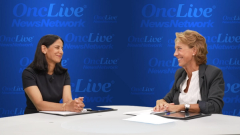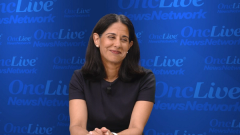
Interpreting Data With CDK4/6 Inhibitors in HR+ Metastatic Breast Cancer
In the context of recent clinical trials, experts share their perspective on the selection and use of CKD4/6 inhibitor therapy in patients with HR+ metastatic breast cancer.
Episodes in this series

Transcript:
Sara M. Tolaney, MD, MPH: We’ve seen a lot of other exciting data come out in the metastatic hormone receptor-positive setting. I was very eager to see the data of 1 trial in particular; it was from MONARCH 3 [NCT02246621], post ASCO [American Society of Clinical Oncology Annual Meeting 2022], where we’d seen survival data from PALOMA-2 [NCT01740427]. I was curious to hear what you thought of the MONARCH 3 data and how it impacts your vision of the 3 CDK4/6 inhibitors. Does it have an impact on what you’re going to select for patients?
Eva M. Ciruelos Gil, MD, PhD: That’s a fantastic question because it is really relevant for making decisions in the clinic. Fortunately, the majority of clinicians have the opportunity to choose between palbociclib [Ibrance], ribociclib [Kisqali] , and abemaciclib [Verzenio]. Which is our preferred first option? Even when overall survival [OS] hasn’t been the primary objective in any of these trials, suddenly it has converted into a very important thing. So we used to work with progression-free survival results until the first of these 7 randomized trials with CDK4/6 inhibitors achieved a significant impact on overall survival. From then, we’ve been comparing overall survival for the rest of them. This is a curious thing, yet funny thing for me. It’s relevant because we have the choice to choose between drugs despite comorbidities, toxicity profiles, and experience. I think that is the most important in overall survival results because that is the general gold standard in oncology. I have to say, ribociclib is the only drug that has robust data on progression-free survival and overall survival in pre- and postmenopausal patients. At least for me, I think that ribociclib should be the first option, even though it has not been used the most frequently because all of us have been using palbociclib for the past 10 years. Experience is great, and real-world data are great, but overall survival results are not statistically significant.
PALOMA-2 had bad luck in being the first trial in the first-line scenario. Maybe that is why many trials censor patients because they discontinued the double-blind treatment, and they went into palbociclib because of the patients’ and investigators’ decision. This has been an issue: to achieve statistically significant results favoring overall survival. Data are difficult to change. Overall, I would say that maybe ribociclib is the preferred option. Palbociclib is still up there with much more experience in real world as well. Lastly, we suddenly have abemaciclib. Abemaciclib was the third, maybe the most potent, clinically speaking. From MONARCH 2 [NCT02107703] and MONARCH 3 trials, we have data that this drug has impressive efficacy in visceral metastases in patients who relapse very early after the adjuvant treatment, and in tumors that seems to have a higher great or low PR [progesterone receptor] expression. This is some type of more biologically aggressive disease. I’ve been using abemaciclib for those patients who relapse very early on during adjuvant treatment and have visceral metastases. We don’t have final analysis on overall survival. MONARCH 3 has shown results that are not statistically significant, but it could be clinically meaningful in favoring abemaciclib for first-line patients. In a few months, we’ll have the final results, or maybe the end of next year. This is what we have today: robust data favoring ribociclib, which shows the high probability to achieving positive results in overall survival as well as in the next follow-up because 20% of patients are still alive in the sixth year. This is impressive. I think that the longer the follow-up, the more we’ll achieve statistical results. So this could be my second and third option for comorbidities or because of experience….I think that palbociclib is still there¾ especially in combination with new agents. SERDs [selective estrogen receptor degraders] and many other new compounds are being tested in combination with palbociclib because of that excellent toxicity profile. We shouldn’t forget that. This could be the companion CDK inhibitor when we’re trying to use new drugs in this landscape.
Sara M. Tolaney, MD, MPH: Excellent overview. It’s really nice to see that we have choice. It is definitely exciting to see the overall survival from MONARCH 3. Again, it’s not statistically significant, but definitely has almost more than a 13-month OS difference, which is very clinically meaningful.
Transcript edited for clarity.





































